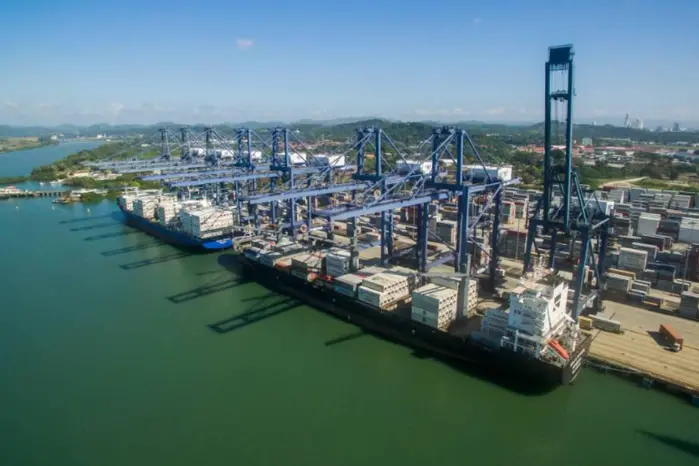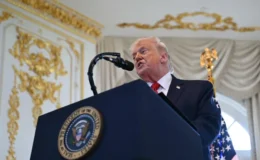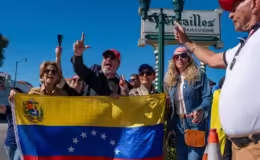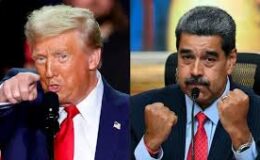An unconventional “Canal War” exists between US and Chinese corporations for Port control.
- By : James Bryson
- Category : Canal, Energy/Infrastructure, International Relations

For many, the ports of Cristóbal and Balboa are just another prize in one of the largest transactions in recent maritime history, but for Panama, they are precious resources, operated for decades to the detriment of national interests and now finally able to operate under new terms.
Both ports are currently operated by Panama Ports, a subsidiary of the Chinese company CK Hutchison. On March 4 of this year, CK Hutchison and the Blackrock-TIL Consortium issued a joint statement announcing their intention to sell CK Hutchison’s ports around the world, including Cristobal and Balboa, for $22.8 billion. They agreed to 145 days for exclusive negotiations, although they expected to reach a final agreement by April.
Months passed, and the transaction never materialized. The Chinese government announced an investigation into the company for monopolistic practices, and the dispute heightened geopolitical tensions between the Asian country and the United States, which accuses China of controlling the Panama Canal.
On Sunday, July 27, the 145-day exclusivity period expired. The following day, China announced its interest in involving a major Chinese investor in the transaction. According to international media, it could be the state-owned shipping company Cosco Shipping. That same week, the French company Compagnie Maritime d’Affrètement and Compagnie Générale Maritime (CMA CGM) also expressed interest.
This is a power play between the major container lines, MSC (part of the agreement with Blackrock), Maersk, Cosco, and CMA CGM, seeking control of different points in the logistics value chain around the world. The 43 ports for sale by CK Hutchison could tip the trade balance.
On Wednesday, Comptroller General Anel Flores held a press conference where she announced the filing of two lawsuits against the contract law approved by the National Assembly and signed between the State and Panama Ports: one for unconstitutionality and the other for nullity.
When asked what effect these demands would have on the international transaction, he responded: “That’s not an issue that concerns Panama. What does concern Panama is that the ports are ours. They belong to the Republic of Panama, and therefore, to all Panamanians. And I don’t think it’s right that there are other people in other latitudes negotiating the future of assets that belong to us Panamanians.”
What happens then with the contract? The decision is in the hands of the Supreme Court. But the President of the Republic, José Raúl Mulino, has made it clear that he sees no future for the legal contract and that, as with the mining project, he is seeking another type of contractual relationship.
“The Court now has the decision in its hands regarding the very well-founded arguments the Comptroller has raised on the matter. We will await that verdict,” Mulino stated during his weekly press conference on Thursday. “Regarding the ports and the mine, they are public-private partnerships. I can’t provide further details. For the simple reason that it’s better that way. The country will be fully informed about the decisions that are made, when they are made. But at this time, I don’t see the continuation of this Panama Ports contract, whether amended or not, nor the creation of a new legal contract. The State has the authority to establish partnerships in these types of matters,” he concluded.
Public-Private Partnerships (PPPs) are a model regulated in Panama by Law 93 of September 19, 2019, through which the State enters into a long-term contract with a private investor, acting through a public entity.
“I love the idea of a public-private partnership. It would be extraordinary, because the idea would be for the State to enjoy profitability from its main asset, but for it to use that profitability to provide opportunities for other national territories that are disconnected due to their geographical position, also by building ports and piers. There are nearly 300 coastal towns that don’t even have a small pier,” commented Carlos González De La Lastra, former Secretary General of the Panama Maritime Authority (AMP) and one of the main promoters of the General Ports Law, as well as Panama’s National Maritime Strategy. “The current legal and constitutional framework, along with ratified international conventions, offer a concrete opportunity today to regain state control over the port system. We now have the legal framework that justifies Panama to make substantial changes to the contracts,” he emphasized.
De La Lastra agrees with President Mulino in seeking a path other than contract laws. “What is the root of the problem we have right now? The root of the problem we have is the contract laws and the lack of recognition by the State during the first wave of port concessions. The so-called contract laws approved by the National Assembly became the instrument used to legalize concessions with asymmetric conditions and, in many cases, favoring private interests. This model gave rise to institutionalized corruption practices under the logic that, for me, exists, undermining the credibility and capacity of the State. This logic, for me, is due to the fact that contract laws have to be approved by the Assembly. And the deputies, when a contract law arrived, negotiated,” he explained.
For the former secretary of the AMP, state participation is essential and the General Port Law should be the guiding principle. The purpose of this law is to be the basis upon which all port concession contracts are based. The signing of contracts under the law circumvents this objective.
De La Lastra also emphasizes that the country must work on its logistics strategy by improving connectivity, not only at ports but also at highways, airports, and all links in the logistics chain. He believes Panama has the tools to move from being merely a transshipment site to becoming a producer and exporter capable of competing in the global market.
Former President Ernesto Pérez Balladares led the privatization process of the ports and the signing of the contract with Hutchison in 1997. Now, he advocates for state intervention. “The country can’t wait any longer. The Maritime Authority must assume control and intervene in the ports of Cristóbal and Balboa while the legal issue is resolved,” he said in an interview with TVN Noticias. “What we have to do is get rid of this group that has behaved like real criminals toward us. I believe we have all the legal capacity to do so,” he added.
The original contract signed during the Pérez Balladares administration contemplated a benefit to the country of 10% of the company’s gross revenue, plus a fixed annual fee of $22.2 million. Resolution 14, of May 13, 2002, issued during the Mireya Moscoso administration, changed the terms of the contract. Essentially, the fixed contribution and 10% of revenue were eliminated, replacing them with a percentage of profits. Panama Ports would later “outsource” some services, further diluting the state’s profits.
“They slipped in a clause stating that the conditions set forth in these contracts, the new ports, would be applicable to previously granted contracts. They slipped it in, like the classic trap, and that’s what I see here, and that gave them a certain legal framework to make the changes, but the changes were a disaster,” De La Lastra explained. “I remember that in Panama we conducted an inspection and in the first three days we discovered that they owed us three million dollars to the Maritime Authority,” he added.
In January 2025, the Comptroller’s Office launched a new audit of Panama Ports. According to the preliminary report, the loss of assets to the state during the concession period exceeds $1.3 billion.
What does the company say?
After the Comptroller’s Office announced the filing of the lawsuits, Panama Ports Company (PPC) issued a statement warning about legal certainty and the impact on foreign investment. “Regarding the ongoing legal actions, we firmly believe that respect for legal certainty and the rule of law provide companies and investors with the certainty that Panama is a safe country to invest in.”
He also commented on the sale process and the Panamanian government’s involvement. “When the time comes in the sale process, PPC will conduct the relevant communications, including the corresponding actions with the Government of Panama. We affirm that we believe collaboration with the Government of Panama is vital to discuss the path forward for PPC and that we want to work with the Government for a better future to support Panama,” he concluded.



No Comments